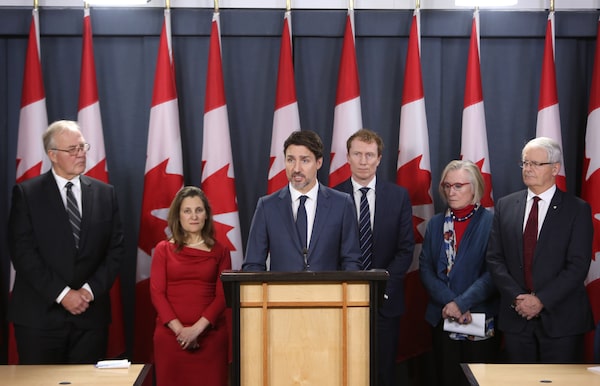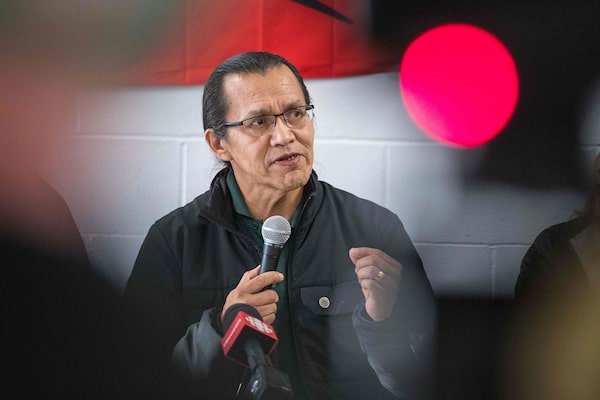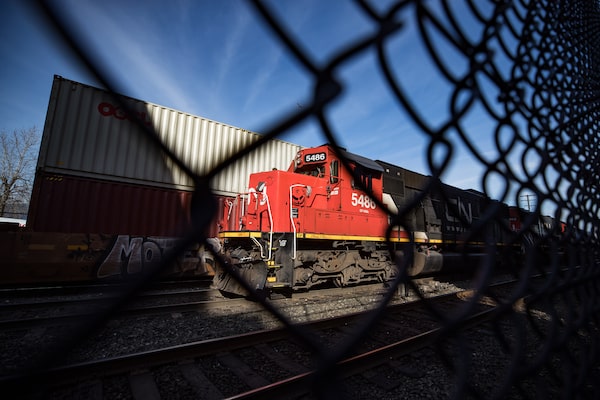
Police surround protestors at a rail blockade in Saint-Lambert, Que. on Friday, February 21, 2020.Paul Chiasson/The Canadian Press
Justin Trudeau adopted a sharp shift in tone Friday, calling for an immediate end to rail blockades and expressing frustration that Indigenous protesters have refused to meet with his government to resolve the crisis as it heads into a third week.
The Prime Minister said the patience of Canadians is wearing thin and the continuing rail disruptions are damaging the Canadian economy.
Wet’suwet’en chiefs vs. RCMP: A guide to the dispute over B.C.’s Coastal GasLink pipeline
Watchdog decries RCMP conduct at Wet’suwet’en protests in B.C.
Mr. Trudeau held a news conference Friday afternoon in Ottawa following a meeting of his government’s incident-response group. The meeting focused on the current blockades, as well as last month’s downing of a passenger plane in Iran and the coronavirus situation.
The government noted that repeated offers to meet with Wet’suwet’en hereditary chiefs have been ignored.
“Here’s the reality: Every attempt at dialogue has been made. The discussions have not been productive. We can’t have dialogue when only one party is coming to the table. For this reason, we have no choice but to stop making the same overtures. Of course, we will never close the door on dialogue, and our hand remains extended should someone want to reach for it,“ he said.
“But the fact remains, the barricades must now come down. The injunctions must be obeyed and the law must be upheld.”

Prime Minister Justin Trudeau holds a news conference with members of his cabinet to discuss the current rail blockades and other topics at a news conference in Ottawa Friday, February 21, 2020.Fred Chartrand/The Canadian Press
Mr. Trudeau said the path to reconciliation with First Nations is at stake, adding he fears that non-Indigenous Canadians could “close their heart” to efforts to forge a new relationship if the crisis drags on.
Mr. Trudeau did not rule out the possibility of a police intervention to bring down the barricades, but did insist he will not call in the Canadian Armed Forces.
“We do not use the army against Canadian civilians,” he said.
One of the newer protest sites on CN tracks in Saint-Lambert South of Montreal broke up Friday night after police cordoned off the area. The protest, which started Tuesday and consisted mainly of students and anti-capitalist groups, was distinct from the ongoing Mohawk blockades near Belleville and at Kahnawake, south of Montreal. Two other indigenous-led rail protests also continued in eastern Quebec.
Shortly after Mr. Trudeau spoke, British Columbia’s Wet’suwet’en hereditary chiefs held a news conference in Tyendinaga, Ont., where they were visiting their Mohawk supporters who have blocked the key Canadian National Railway line linking Montreal and Toronto for more than two weeks. The protest near Belleville has been the most economically disruptive of several related rail blockades across the country.
The travelling hereditary chiefs oppose the passage of Coastal GasLink’s (CGL’s) $6.6-billion natural gas pipeline through their traditional territory in northern British Columbia, though others in the community, including elected band members, support the project.
Wet’suwet’en hereditary Chief Woos, who also goes by Frank Alec, said the protests and blockades will continue until the RCMP and Coastal GasLink workers leave their traditional territory.

Wet'suwet'en hereditary chief Frank Alec Woos speaks during a press conference at the Mohawk Community Centre in Tyendinaga, Ontario, on February 21, 2020, as Mohawks protest in solidarity with the Wet'suwet'en hereditary chiefs opposed to the LNG pipeline in northern British Columbia.LARS HAGBERG/AFP/Getty Images
“Wet’suwet’en hereditary chiefs have put a path of peace forward in order that nation-to-nation discussions with Canada and B.C. may occur freely and without duress,” he said at a news conference. “We demand the remote detachment community-industry service office established by the RCMP on Wet’suwet’en territory without our consent be immediately removed and that the RCMP are completely removed from our territory and cease patrols from our lands. Out means out.
“We demand that all CGL activities cease within Wet’suwet’en territory while nation-to-nation talks are ongoing [according] to the eviction notice that was delivered to them on Jan. 4, 2020. We commit to entering into a nation-to-nation discussion, with Canada and B.C. once the two above demands are met and we insist that these discussions occur, that they will be held, on Wet’suwet’en territory to ensure inclusivity.”
The chiefs were asked what would happen if the Ontario Provincial Police attempted to remove the rail blockade.
First Nations members of the Tyendinaga Mohawk Territory maintain a camp next to a railway crossing, in support of the Wet'suwet'en Nation, in Tyendinaga, Ont., on Feb. 21, 2020.CHRIS HELGREN/Reuters
“I think that’s a matter of national security,” said Seth Lefort, who sat next to Chief Woos at the news conference and is one of the Mohawks protesting in solidarity with the hereditary chiefs.
Andrew Brant, who is from the nearby Tyendinaga Mohawk Territory, said morale at the Tyendinaga rail blockade is high following the news conferences.
“We are standing strong and peaceful,” he said. “The Prime Minister has declared war on Indigenous peoples.“
Mr. Brant said he was unable to comment on whether or not Mohawk protesters are taking any precautionary measures.
”We’re not going to be moving until all the demands are met,” he said. “We’re not going to deviate because we know the tactics and tricks.”
Ontario Premier Doug Ford called for a co-ordinated end to all blockades.
“The Prime Minister needs to step up and take responsibility. Enough is enough. The illegal blockades must come down,“ he said in a statement. “This is a national emergency and innocent people from coast to coast are being hurt. The federal government must co-ordinate action to take down these illegal blockades across the country.”
The federal government has repeatedly pointed out that policing decisions related to protests in B.C., Ontario and Quebec are the responsibility of provincial police forces.

CN Rail locomotives are moved on tracks past cargo containers sitting on idle train cars at port in Vancouver, on Friday, February 21, 2020.DARRYL DYCK/The Canadian Press
B.C. Premier John Horgan said Friday that it has been complicated trying to negotiate with the Wet’suwet’en with no one reaching out from their end for talks.
“It’s a challenge,” Mr. Horgan told the media following a speech to the Greater Vancouver Board of Trade. “We continue to be ready to go. We have always been ready to go,” he said. “The way forward is not to abandon co-operation, consensus and harmony. The way forward is to redouble your efforts to get that.”
He noted that more voices, beyond the hereditary leaders, are speaking up about the need to figure out how to go forward.
Manitoba Premier Brian Pallister said the protests risk harming the cause of reconciliation in the eyes of the broader public.
In an interview with The Globe and Mail Friday, Mr. Pallister said the conversation should move toward practical measures to improve the lives of First Nations while also being clear that no individual or group has an absolute veto on natural-resources projects.
“Public opinion matters on these things,” he said. “This federal Liberal government has said that reconciliation is a priority. But if you want real reconciliation, then you have to do the real work of achieving it. And you have to establish some parameters. You have to put a fence around the discussion to some degree. And you don't do that if you don't make it clear that everyone does not have a veto.”

Police surround protestors at a rail blockade in Saint-Lambert, Que. on Friday, February 21, 2020.Paul Chiasson/The Canadian Press
Quebec Premier François Legault softened his tone slightly on Friday, saying it’s up to police to decide the best way to dismantle barricades. On Thursday, he said police would intervene immediately after a court granted an injunction against the newest barricade in Saint-Lambert, Que., that day.
“I expect the dismantling to happen soon, but it’s up to the police. It’s not for me to say how and when they should intervene,” he told reporters in Montreal, adding that the cost of the protest is “hundreds of millions of dollars in losses every day.”
The B.C. RCMP issued an update Friday, stating that planning is under way to move a temporary outpost – known as the community-industry safety office – to the nearby town of Houston, B.C.
The outpost has been a source of tension in the community and some hereditary chiefs have said protests will continue until the RCMP leave Wet’suwet’en traditional territory.
With reports from Ian Bailey, Les Perreaux, Daniel Leblanc and Laura Stone
Our Morning Update and Evening Update newsletters are written by Globe editors, giving you a concise summary of the day’s most important headlines. Sign up today.
 Bill Curry
Bill Curry